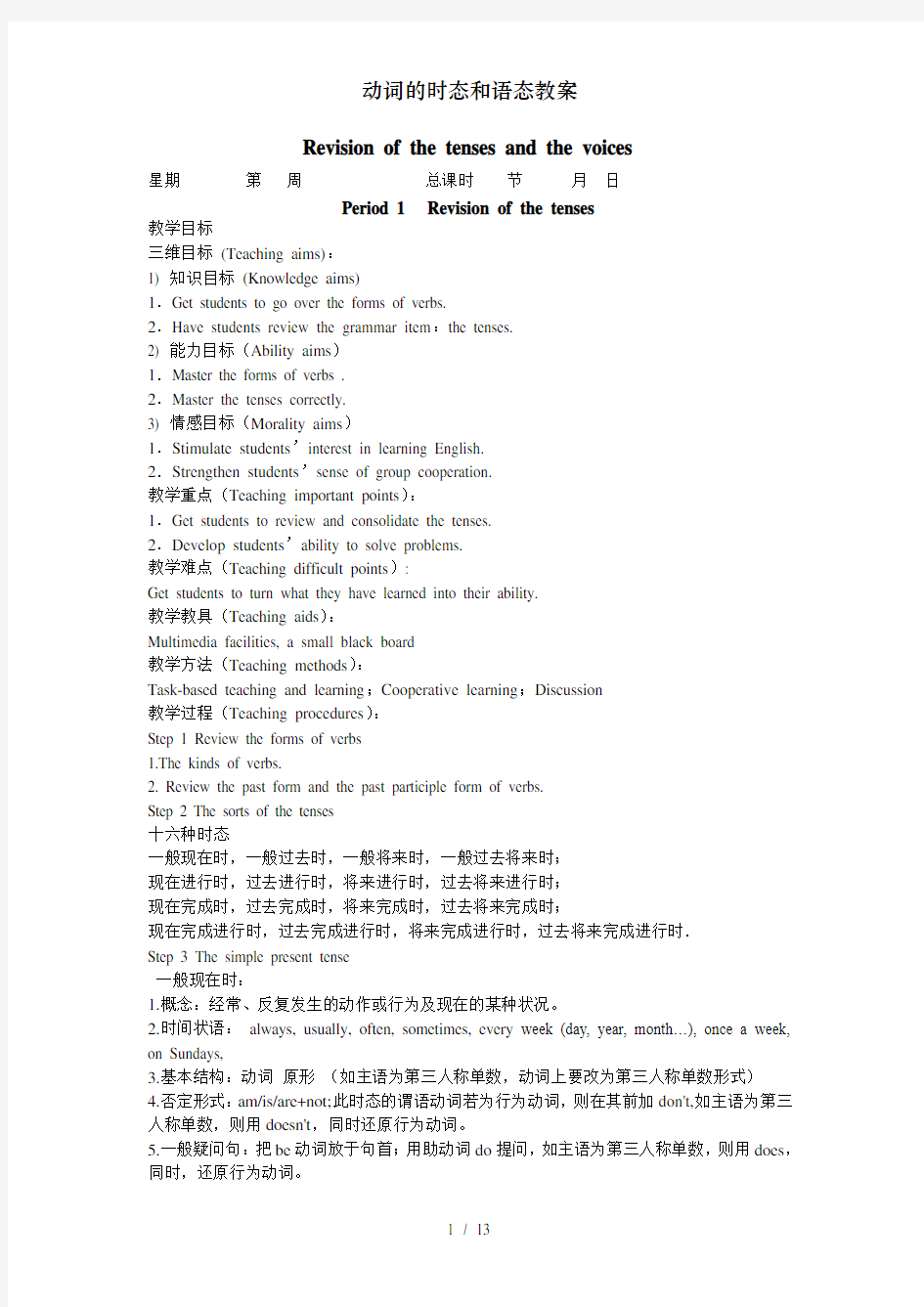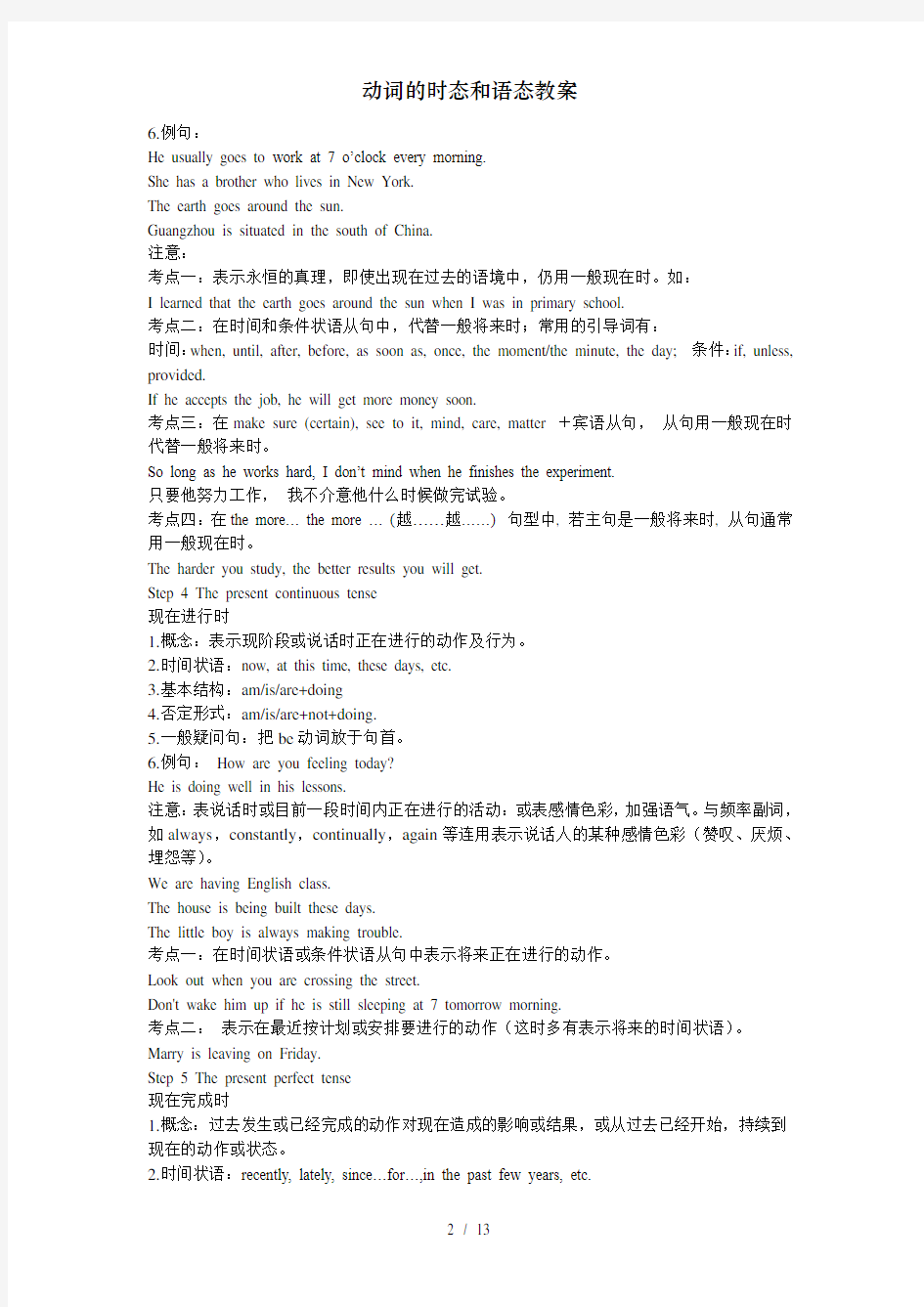动词的时态和语态教案


Revision of the tenses and the voices
星期第周总课时节月日
Period 1 Revision of the tenses
教学目标
三维目标(Teaching aims):
1) 知识目标(Knowledge aims)
1.Get students to go over the forms of verbs.
2.Have students review the grammar item:the tenses.
2) 能力目标(Ability aims)
1.Master the forms of verbs .
2.Master the tenses correctly.
3) 情感目标(Morality aims)
1.Stimulate students’interest in learning English.
2.Strengthen students’sense of group cooperation.
教学重点(Teaching important points):
1.Get students to review and consolidate the tenses.
2.Develop students’ability to solve problems.
教学难点(Teaching difficult points):
Get students to turn what they have learned into their ability.
教学教具(Teaching aids):
Multimedia facilities, a small black board
教学方法(Teaching methods):
Task-based teaching and learning;Cooperative learning;Discussion
教学过程(Teaching procedures):
Step 1 Review the forms of verbs
1.The kinds of verbs.
2. Review the past form and the past participle form of verbs.
Step 2 The sorts of the tenses
十六种时态
一般现在时,一般过去时,一般将来时,一般过去将来时;
现在进行时,过去进行时,将来进行时,过去将来进行时;
现在完成时,过去完成时,将来完成时,过去将来完成时;
现在完成进行时,过去完成进行时,将来完成进行时,过去将来完成进行时.
Step 3 The simple present tense
一般现在时:
1.概念:经常、反复发生的动作或行为及现在的某种状况。
2.时间状语:always, usually, often, sometimes, every week (day, year, month…), once a week, on Sundays,
3.基本结构:动词原形(如主语为第三人称单数,动词上要改为第三人称单数形式)
4.否定形式:am/is/are+not;此时态的谓语动词若为行为动词,则在其前加don't,如主语为第三人称单数,则用doesn't,同时还原行为动词。
5.一般疑问句:把be动词放于句首;用助动词do提问,如主语为第三人称单数,则用does,同时,还原行为动词。
6.例句:
He usually goes to work at 7 o’clock every morning.
She has a brother who lives in New York.
The earth goes around the sun.
Guangzhou is situated in the south of China.
注意:
考点一:表示永恒的真理,即使出现在过去的语境中,仍用一般现在时。如:
I learned that the earth goes around the sun when I was in primary school.
考点二:在时间和条件状语从句中,代替一般将来时;常用的引导词有:
时间:when, until, after, before, as soon as, once, the moment/the minute, the day; 条件:if, unless, provided.
If he accepts the job, he will get more money soon.
考点三:在make sure (certain), see to it, mind, care, matter +宾语从句,从句用一般现在时代替一般将来时。
So long as he works hard, I don’t mind when he finishes the experiment.
只要他努力工作,我不介意他什么时候做完试验。
考点四:在the more… the more … (越……越……) 句型中, 若主句是一般将来时, 从句通常用一般现在时。
The harder you study, the better results you will get.
Step 4 The present continuous tense
现在进行时
1.概念:表示现阶段或说话时正在进行的动作及行为。
2.时间状语:now, at this time, these days, etc.
3.基本结构:am/is/are+doing
4.否定形式:am/is/are+not+doing.
5.一般疑问句:把be动词放于句首。
6.例句:How are you feeling today?
He is doing well in his lessons.
注意:表说话时或目前一段时间内正在进行的活动:或表感情色彩,加强语气。与频率副词,如always,constantly,continually,again等连用表示说话人的某种感情色彩(赞叹、厌烦、埋怨等)。
We are having English class.
The house is being built these days.
The little boy is always making trouble.
考点一:在时间状语或条件状语从句中表示将来正在进行的动作。
Look out when you are crossing the street.
Don't wake him up if he is still sleeping at 7 tomorrow morning.
考点二:表示在最近按计划或安排要进行的动作(这时多有表示将来的时间状语)。Marry is leaving on Friday.
Step 5 The present perfect tense
现在完成时
1.概念:过去发生或已经完成的动作对现在造成的影响或结果,或从过去已经开始,持续到现在的动作或状态。
2.时间状语:recently, lately, since…for…,in the past few years, etc.
3.基本结构:have/has + done
4.否定形式:have/has + not +done.
5.一般疑问句:have或has。
6.例句:I've written an article.
The countryside has changed a lot in the past few years.
注意:
现在完成时表示动作发生在过去,完成在过去,但强调与现在情况仍有联系,其结果或影响仍存在。现在完成时有一些标志性的时间状语:
考点一:for + 时间段;since + 时间点
They have lived in Beijing for five years.
They have lived in Beijing since 1995.
I have learned English for ten years.
考点二:常见的不确定的时间状语:lately; recently, just, already, yet, up to now; till now; so far, these days,
Has it stopped raining yet ?
考点三:在表示“最近几世纪/ 年/ 月以来……”时间状语中,谓语动词用现在完成时。
in the past few years/months/weeks/days;over the past few years; during the last three months; for the last few centuries, through centuries; throughout history 等
考点四:表示“第几次做某事,”或在“It is the best (worst, most interesting ) +名词+that” 后面跟现在完成时。
This is my first time that I have visited China.
This is the most interesting film I have ever seen.
That is the only book that he has written.
Step 6 The simple past tense
一般过去时
1.概念:过去某个时间里发生的动作或状态;过去习惯性、经常性的动作、行为。
2.时间状语:ago, yesterday, the day before yesterday, last week, last(year, night, month…), in 1989, just now, at the age of 5, one day, long long ago, once upon a time, etc.
3.基本结构:be动词;行为动词的过去式
4.否定形式:was/were+not;在行为动词前加didn't,同时还原行为动词。
5.一般疑问句:was或were放于句首;用助动词do的过去式did 提问,同时还原行为动词。
6.例句:She often came to help us in those days.
I didn't know you were so busy.
注意:
一般过去时表在过去某个特定时间发生且完成的动作,或过去习惯性动作,不强调对现在的影响,只说明过去。常跟明确的过去时间连用,如:yesterday; last week; in 1945, at that time; once; during the war; before; a few days ago; when, 注意:
考点一:used to + do,表示过去经常但现在已不再维持的习惯动作。to为不定式,后接动词原形。
be/become/get used to + doing,表示习惯于
He used to smoke a lot.
He has got used to getting up early.
考点二:在时间和条件状语从句中,代替过去将来时。
He promised to buy me a computer if he got a raise
Step 7 Exercises
高考题点击:
1. --- Can I help you, sir?
--- Yes, I bought this radio here yesterday, but it _____. (96 N)
A. didn’t w ork
B. won’t work
C. can’t work
D. doesn’t work
2. I _____ ping-pong quite well, but I haven’t had time to play
since the new year. (2001 N)
A. will play
B. have played
C. played
D. play
3. E-mail, as well as telephone, _____ an important part in daily communication. (99 上海)
A. is playing
B. have played
C. are playing
D. play
4. Selecting a mobile phone for personal use is no easy task because technology _____ so rapidly. (2001 N)
A. is changing
B. has changed
C. will have changed
D. will change
5. --- I’m sorry to keep you waiting. (94 N)
--- Oh, not at all. I _____ here only a few minutes.
A. have been
B. had been
C. was
D. will be
6. --- You haven’t been to Beijing, have you?
--- _____. How I wish to go there! (98 N)
A. Yes, I have
B. Yes, I haven’t
C. No, I have
D. No, I haven’t
7. --- Hi, Tracy, you look tired.
--- I am tired. I _____ the living room all day. (98 N)
A. painted
B. had painted
C. have been painting
D. have painted
8. I wonder why Jenny ______ us recently. We should have heard from her by now.(N2002)
A. hasn’t written
B. doesn’t write
C. won’t write
D. hadn’t write
9. --- Nancy is not coming tonight.
--- But she _____! (98 N)
A. promises
B. promised
C. will promise
D. had promised
10. My uncle _____ until he was forty-five. (2000 上海)
A. married
B. didn’t marry
C. was not marrying
D. would marry
11. --- You haven’t said a word about my new coat, Brenda. Do
you like it? (N2002)
--- I’m sorry I _______ anything about it sooner. I certainly
think it’s pretty on you.
A. wasn’t saying
B. don’t say
C. won’t say
D. didn’t say
12. As she ____ the newspaper, Granny ____ asleep. (95 N)
A. read … was f alling
B. was reading … fell
C. was reading … was falling
D. read … fell
13. --- Alice, why didn’t you come yesterday?
